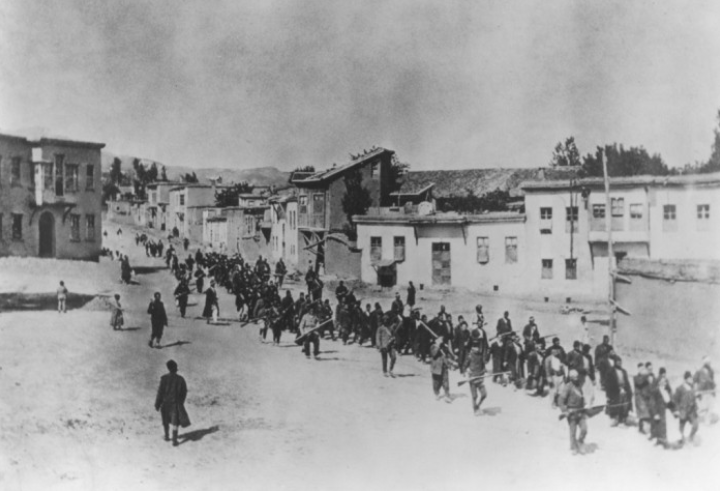A joint motion recognising the Armenian genocide supported by People Before Profit, Solidarity, Sinn Féin, the Social Democrats and the Labour Party has been placed on the Dáil agenda.
Paul Murphy TD, the People Before Profit representative who initiated the motion commented:
“With a genocide happening right now in Gaza, it is vital that we recognise the Armenian genocide that took place 110 years ago. This genocide which saw around 1.5 million people killed set the template for subsequent genocides to today - ethnic cleansing, forced displacement and famine. It is past time for the Irish state to recognise this genocide.”
Senator Patricia Stephenson, Foreign Affairs spokesperson for the Social Democrats said:
“For a lasting and just peace, the recognition of the harms of the past is always a crucial and necessary first step, which is why the Social Democrats are supporting the motion for the Commemoration of the Armenian Genocide, to remember and honour those who died. This is not simply about history - there are people living today, who are having their communities’ experiences denied, contributing to a sense of erasure and intergenerational trauma. Human Rights Defenders have faced persecution and criminalisation in Turkey for campaigning for the recognition of the genocide. This motion is an important act of solidarity with those HRDs and the Armenian community more broadly.”
Duncan Smith TD, Foreign Affairs spokesperson for the Labour Party commented:
“The passage of time should not diminish the call for truth and justice. The Armenian Genocide has for too long been forgotten by history. This motion goes a small way to helping to correct that historical justice.”
Michael Kharabian, Chairman of the Armenian Democratic Liberal Party, one of the main Armenian Diaspora organizations globally, leading Diasporan communities since 1921 said:
“In the 110 years since the Armenian Genocide, the international community has made significant progress in recognizing and condemning the crime of genocide perpetrated by the then leaders of the Ottoman empire and subsequently the Young Turk leadership Talaat, Enver, and Djemal Pashas. Today’s ongoing commitment by the Armenian Diaspora to condemn and punish the crimes of genocide by UN member states, human rights commissions, national leaderships, national assemblies, international organizations, and opinion leaders, remain equally vital for preventing new genocidal atrocities anywhere and for upholding the moral responsibility of the international community to act decisively in the face of early warning sign during conflicts. Our persistent obligation to combat historical injustices against humanity, including those perpetrated by Ottoman Turkey and the Young Turk leadership, is crucial for safeguarding the principles of Human Rights, affirmation of fundamental human dignity and assurance for global justice through accountability.
For Armenians around the world—especially those who continue to face existential threats—such recognition carries profound moral and political weight. Ireland has consistently stood with the oppressed and spoken out against injustice. We trust that both the Irish government and the Irish people will once again stand on the right side of history by formally recognizing the Armenian Genocide.”
Barouyr Demirjian the European Liaison of the Armenian Rights Council said:
“Irish people have a proud history of standing up for the oppressed, having started the South African boycott, and I am delighted to see them doing it for Armenia. We are now a small country in land mass but a large population across the world due to this genocide. This motion means so much to those not only within modern-day Armenia but to the millions of families now across the world, including the USA and France, with their own personal family story of fleeing this persecution”.
“The Armenian Genocide established the horrific template for 20th-century mass atrocities which ensued thereupon, its lessons tragically ignored as the world witnessed subsequent genocides in Cambodia, Rwanda, and Darfur. The Republic of Armenia, through Article 11 of its 1990 Declaration of Independence, continues its pursuit of global recognition and justice.The prevention of genocide remains humanity's most urgent moral imperative; when the international community fails to confront systematic destruction of peoples, it becomes complicit in history's darkest repetitions”.
“Justice delayed is justice denied.”
Dr. Edita Gzoyan, the Director of the Armenian Genocide Museum Institure, an author and researcher said:
“Recognizing genocide is not only about acknowledging the pain and suffering of the past — it is a profound moral imperative that influences our collective conscience, shapes the principles by which we live today, and fortifies our commitment to a more just and humane future. The Armenian Genocide, as one of the earliest and most systematic attempts to annihilate an entire people in the 20th century, serves as a harrowing warning of what can occur when the international community fails to act, and when crimes against humanity are met with silence, denial, or indifference".
“Genocide denial is not a passive act — it is an active continuation of violence that erases memory, insults survivors, and emboldens those who would repeat such crimes. In an age where hatred, discrimination, and authoritarianism are once again on the rise, failing to recognize past atrocities weakens our moral defenses and erodes the foundations of human rights and international law. Conversely, recognition honors the dignity of victims and survivors, reinforces our shared humanity, and sends a clear message that truth matters — and that there will be consequences for those who seek to destroy others simply for who they are.”
